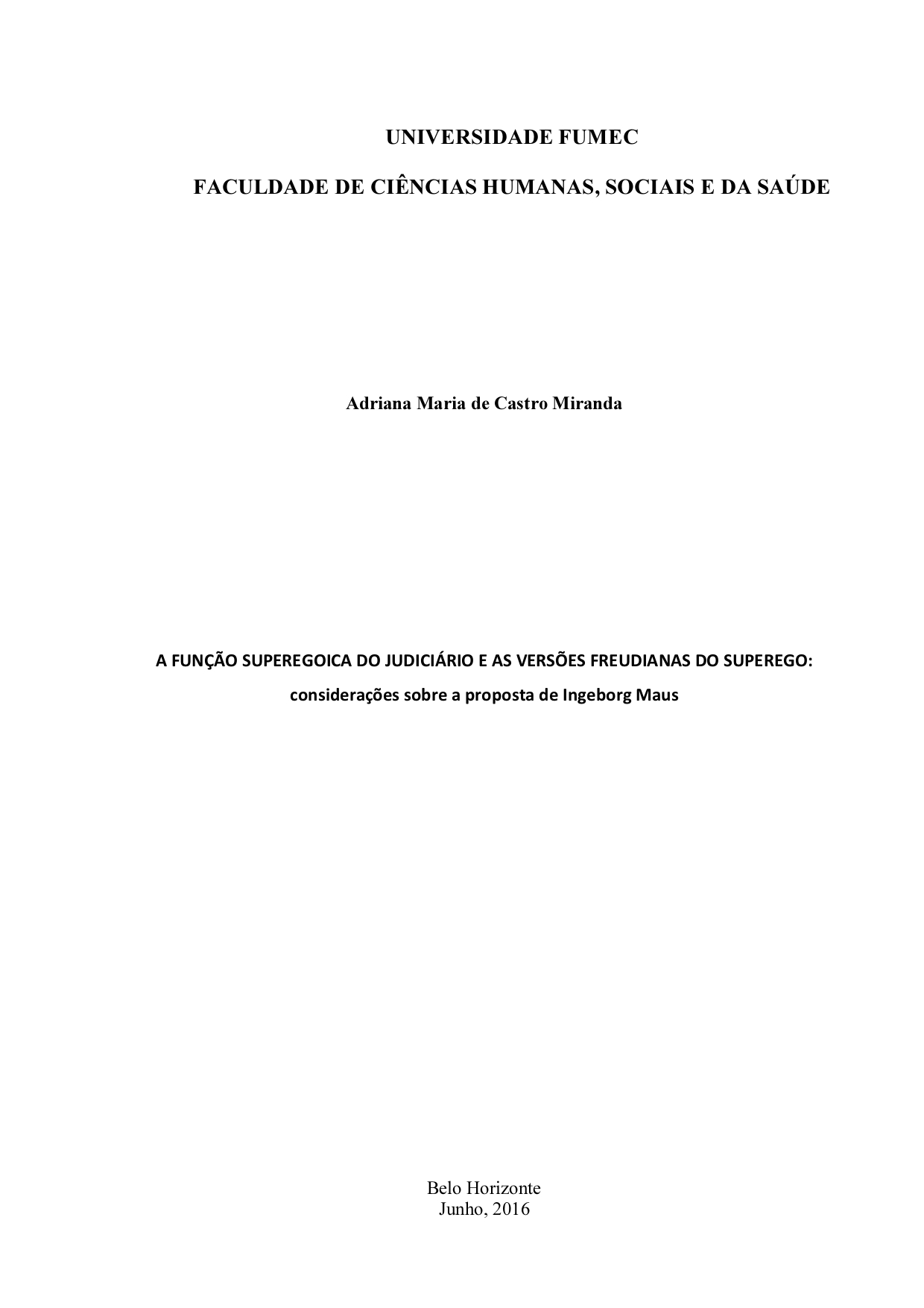A função superegoica do judiciário e as versões freudianas do superego: considerações sobre a proposta de Ingeborg Maus

Visualizar/
Data
2016Autor
Miranda, Adriana Maria de Castro
xmlui.mirage2.itemSummaryView.MetaData
Mostrar registro completoResumo
O tema-problema deste estudo refere-se à análise do texto de Ingeborg Maus, O Judiciário como Superego da Sociedade: a Jurisdição na “Sociedade Órfã de Pai”, em que se procurou verificar a conceituação e, consequentemente, o entendimento de Maus em relação ao superego – uma das três instâncias psíquicas que compõem o aparelho psíquico – e à sociedade órfã. Esta pesquisa busca, assim, proporcionar ao estudioso do Direito, por uma apresentação propositadamente dirigida, o acesso aos conceitos básicos da teoria psicanalítica, em especial das instâncias psíquicas id, ego e superego, necessárias ao entendimento do texto de Maus. Para tal, percorre sucintamente a biografia de Freud, a
Psicanálise e o Movimento Psicanalítico, assim como a teoria psicanalítica freudiana em sua primeira e segunda tópicas, formatação estabelecida por seu criador. Como metodologia de pesquisa, utilizou-se o estudo bibliográfico da citada teoria psicanalítica para, a partir daí, proceder-se ao exame do texto de Maus. Analisou-se também a conjuntura da Alemanha descrita por essa autora, como forma de balizar as interpretações propostas. A conclusão da pesquisa foi a de que, embora os estudos de Freud revelem duas versões, inicial e finalista, para a instância do superego – a primeira com conotação de controle, direcionamento e referências morais, e, a segunda, com intenções perversas do superego, subjugando e, se necessário, até mesmo adoecendo as demais instâncias psíquicas, como forma de sustentação
de seu domínio, mantendo-se no status de controle –, Maus não chegou a enfrentar a versão
finalista, embora ela seja também considerada pela autora. The problem-thesis of this study is the analysis of Ingeborg Maus article, The Judiciary as Society’s Superego: the Jurisdiction in a “Society orphan os father”, in which it was intended to verify the concept utilized and, consequentially, Maus’s understanding regarding the superego – one of the three psychic instances that integrates the psychic structures – and the orphan society. In that, this research aspires to give Law students, by a presentantion purposefully directed at them, access to the basics of the psychoanalytical theory, specially the psychic instances of the id, ego and superego, necessary to the understanding of Maus text. In order to achieve this, it is made a quick rundown of Freud’s biography, the Psychoanalysis and the Psychoanalitical Movement, and Freud’s psychoanalytical theory in its first and second stages, called those by the author himself. The methodology this research has followed has used
the bibliography mentioned on the aforementioned article to, from that, examine Maus article. Germany’s conjecture as described by the author has been also been analyzed, as a way to fundament the interpretations presented. The research’s conclusion was that, although Freud studies reveal two versions, an initial and a final one, to the superego instance – the first with a controlling connotation, directing and moral references, and, the second, with the superegos perversity, subjugating and, if necessary, even sickening the other psychic instances, as a way to sustain its domination, maintaining itself of control –, Maus did not get to interpret the final version, albeit not disregarded by the author.
